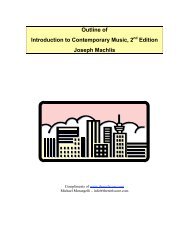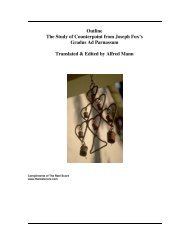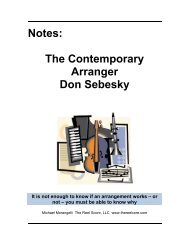An Outline of The History of Western Music Grout ... - The Reel Score
An Outline of The History of Western Music Grout ... - The Reel Score
An Outline of The History of Western Music Grout ... - The Reel Score
You also want an ePaper? Increase the reach of your titles
YUMPU automatically turns print PDFs into web optimized ePapers that Google loves.
1: another new genre - not to be confused with the 18th century Italian opera buffa<br />
- emphasised the smart, witty, and satirical elements <strong>of</strong> comic opera<br />
2: founder was Jacques Offenbach (1819-1880) - works influenced the operettas<br />
<strong>of</strong> W.S. Gilbert (librettist), Arthur Sullivan (composer 1842-1900), and Johann<br />
Strauss the Younger (the Waltz King, eldest son <strong>of</strong> Johann Strauss I 1825<br />
-1899)<br />
e) Symphonic Drama<br />
1: the connecting plot is considered familiar to all thereby permitting the composer<br />
to choose only those scenes most suitable for musical treatment<br />
2: Hector Berlioz (1803-1869)<br />
i- most important dramatic work Damnation de Faust is a symphonic drama<br />
ii- his Les Troyens represents the Romantic consummation <strong>of</strong> the French<br />
opera tradition descended from Lully, Rameau, and Gluck<br />
f) French Lyric Opera<br />
1: the romantic type <strong>of</strong> opéra comique developed into a genre that best be termed<br />
Lyric Opera<br />
i- lying somewhere between opèra comique and grand opera - larger than<br />
opèra comique and smaller than grand opera<br />
ii- main appeal is through melody, its subject matter is romantic drama or<br />
fantasy<br />
2: Georges Bizet (1838-1875)<br />
i- his Carmen (Paris, 1875) became a landmark in the history <strong>of</strong> French opera<br />
ii- a stark, realistic drama ending with a tragic murder was called comique -<br />
indicated that the distinction between opera and opéra comique had<br />
become a technicality<br />
iii- his rejection <strong>of</strong> a sentimental or mythological plot signaled a small but<br />
important move toward realism<br />
3: Composers<br />
i- Ambroise Thomas (1811-1896)<br />
ii- Charles Gounod (1818-1893)<br />
D. Germany<br />
1. Overview<br />
a) <strong>The</strong> interaction between music & literature - typical <strong>of</strong> 19th century Romanticism<br />
developed most fully in Germany<br />
b) Singspiel - at the root <strong>of</strong> German opera - soaked up Romantic elements from<br />
French opera while keeping and intensifying its national features<br />
1: illustrated by Undine (1816) by E.T.A. H<strong>of</strong>fmann (1776-1822) and Faust (1816)<br />
by Ludwig Spohr (1784-1859)<br />
2: established by Der Freischütz (1821) by Carl Maria von Weber (1786-1826)<br />
c) French opéra comique was also popular in Germany between 1830 & 1850<br />
2. Carl Maria von Weber (1786-1826)<br />
a) Principal music teachers were Michael Haydn (1739-1806) and Georg Joseph<br />
Vogler (1749-1814), became director <strong>of</strong> the opera at Prague in 1813 & at Dresden<br />
in 1816





